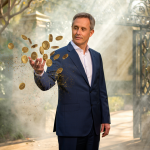
Jun 19, 2025
Picture this: A 22-year-old college grad throws $500 at a penny stock his roommate mentioned. It rockets 400% in three weeks. Suddenly, he’s Warren Buffett reincarnated, ready to quit his job and day-trade full time. Six months later? His account is down 85%, and he’s moving back with his parents. Sound familiar? That’s overconfidence bias in action—the silent portfolio killer that makes us all think we’re geniuses until markets prove us wrong.
Overconfidence bias isn’t just rookie territory. It’s a hardwired cognitive flaw where investors systematically overestimate their knowledge, underestimate risks, and attribute success to skill rather than luck. Nobel laureate Daniel Kahneman called it “the most significant of the cognitive biases,” and for good reason—it’s the gateway drug to every other investing mistake.
The Psychology of Delusion: Why Your Brain Thinks You’re Special
Here’s the brutal truth: 90% of drivers think they’re above average. 80% of investors believe they can beat the market. The math doesn’t work, but your brain doesn’t care. Overconfidence bias operates through three lethal mechanisms:
Overestimation: You think you know more than you do. That hot AI stock tip? You’ve done “research” (read: scrolled Twitter for 20 minutes).
Overplacement: You believe you’re better than others. When GameStop crashes, it’s the “dumb money” getting burned—never you.
Overprecision: You’re too certain about your predictions. Bitcoin to $100K is “guaranteed” because your favorite influencer said so.
The kicker? Success amplifies the delusion. One lucky trade triggers what behavioral economists call “outcome bias”—you mistake a good result for good decision-making. It’s like winning at Russian roulette and thinking you’ve discovered a strategy.
From Meme Stocks to AI Mania: How Overconfidence Destroys Wealth
Remember January 2021? Reddit traders piled into GameStop, convinced they’d outsmarted Wall Street. “Diamond hands” became a rallying cry. The stock soared from $20 to $480. Overconfident traders mortgaged houses, emptied retirement accounts, and borrowed on margin. Then reality hit. Within weeks, GME crashed below $50, leaving a graveyard of blown accounts.
But here’s what’s insidious: The survivors didn’t learn. They doubled down on AMC, Bed Bath & Beyond, and whatever ticker was trending. Overconfidence bias had mutated into its toxic cousin—confirmation bias. They sought evidence supporting their genius while ignoring the mounting losses.
Fast forward to 2024’s AI bubble. Retail investors, high on Nvidia’s 200% run, started throwing money at anything with “AI” in the name. Penny stocks added “AI” to their descriptions and mooned 500%. SPACs with zero revenue but “AI potential” raised billions. Sound familiar? It’s the dot-com playbook with a machine learning twist.
The pattern is predictable: Early winners breed overconfidence. Overconfidence breeds excessive risk. Excessive risk breeds catastrophic losses. Rinse, repeat, bankrupt.
The Leverage Trap: When Confidence Meets Borrowed Money
Overconfidence doesn’t just make you pick bad stocks—it makes you bet the farm on them. Studies show overconfident investors trade 67% more frequently and use 3x more leverage than their humble counterparts. They’re not just wrong; they’re wrong with borrowed money.
Consider crypto’s 2021 peak. Overconfident traders weren’t satisfied with Bitcoin’s 300% gains. They wanted more. So they discovered 100x leverage on offshore exchanges. One trader turned $1,000 into $50,000 in a week. Genius, right? Then Bitcoin dropped 5%—a normal Tuesday in crypto—and his account went to zero. Not $45,000. Zero. That’s the overconfidence tax, paid in full.
The cruelest irony? Overconfident investors don’t just lose money—they lose more money than pessimists. A landmark study by Barber and Odean found that the most confident traders underperformed the market by 6.5% annually. Over 30 years, that’s the difference between retiring rich and working at Walmart.
The Dunning-Kruger Peak: Why Beginners Are the Most Dangerous
Here’s where it gets psychological: The less you know, the more confident you become. It’s called the Dunning-Kruger effect, and it explains why every market bubble is led by newcomers who think they’ve discovered free money.
In 2017, cryptocurrency forums were flooded with teenagers explaining blockchain to computer scientists. In 2021, TikTok traders lectured hedge fund managers about “short squeezes.” Today? AI prompt engineers are teaching venture capitalists about “the future of technology.”
The pattern is universal: A little knowledge creates massive confidence. That confidence attracts more beginners. The herd mentality amplifies. Everyone’s a genius in a bull market—until the music stops.
The Contrarian Cure: Weaponizing Humility
So how does overconfidence bias lead to investment mistakes? It makes you trade too much, leverage too high, diversify too little, and learn too slowly. But here’s the contrarian insight: Your overconfidence is someone else’s edge.
While you’re day-trading meme stocks, humble investors are dollar-cost averaging into index funds. While you’re leveraging crypto positions, they’re building emergency funds. While you’re chasing the next AI moonshot, they’re compound interest is quietly making them rich.
The antidote isn’t complex:
Track everything: Keep a trading journal. Write your thesis before buying. Review it after selling. You’ll be shocked how wrong you were—and how lucky you got.
Embrace base rates: 90% of traders lose money. 80% of active funds underperform indexes. 95% of day traders quit within two years. You’re not special—act accordingly.
Automate humility: Set position limits (max 5% per trade). Use stop-losses (no exceptions). Rebalance mechanically (quarterly, not daily). Let rules overrule confidence.
Study failures, not successes: For every crypto millionaire, there are 1,000 silent losers. For every options guru, there’s a blown account. Survivorship bias makes everyone look smart—dig deeper.
The Billion-Dollar Question
Here’s what nobody tells you: The best investors aren’t confident—they’re terrified. Warren Buffett reads 500 pages daily because he knows how little he knows. Ray Dalio built Bridgewater on “radical transparency” because he distrusts his own judgment. Charlie Munger spent 99% of his time saying “no” because he understood his limitations.
Meanwhile, retail investors with three months of experience are going all-in on small-cap biotech stocks because “the chart looks good.”
The market doesn’t care about your confidence. It doesn’t reward courage or punish fear. It simply transfers wealth from the overconfident to the patient, from the certain to the curious, from those who think they know to those who know they don’t.
So next time you feel like a genius after a winning trade, remember: That feeling isn’t insight—it’s a warning. The moment you think you’ve figured out the market is the moment the market figures out you.
Stop trading like you’re smarter than everyone else. Start investing like you’re dumber than you think. It’s not just contrarian—it’s profitable.










